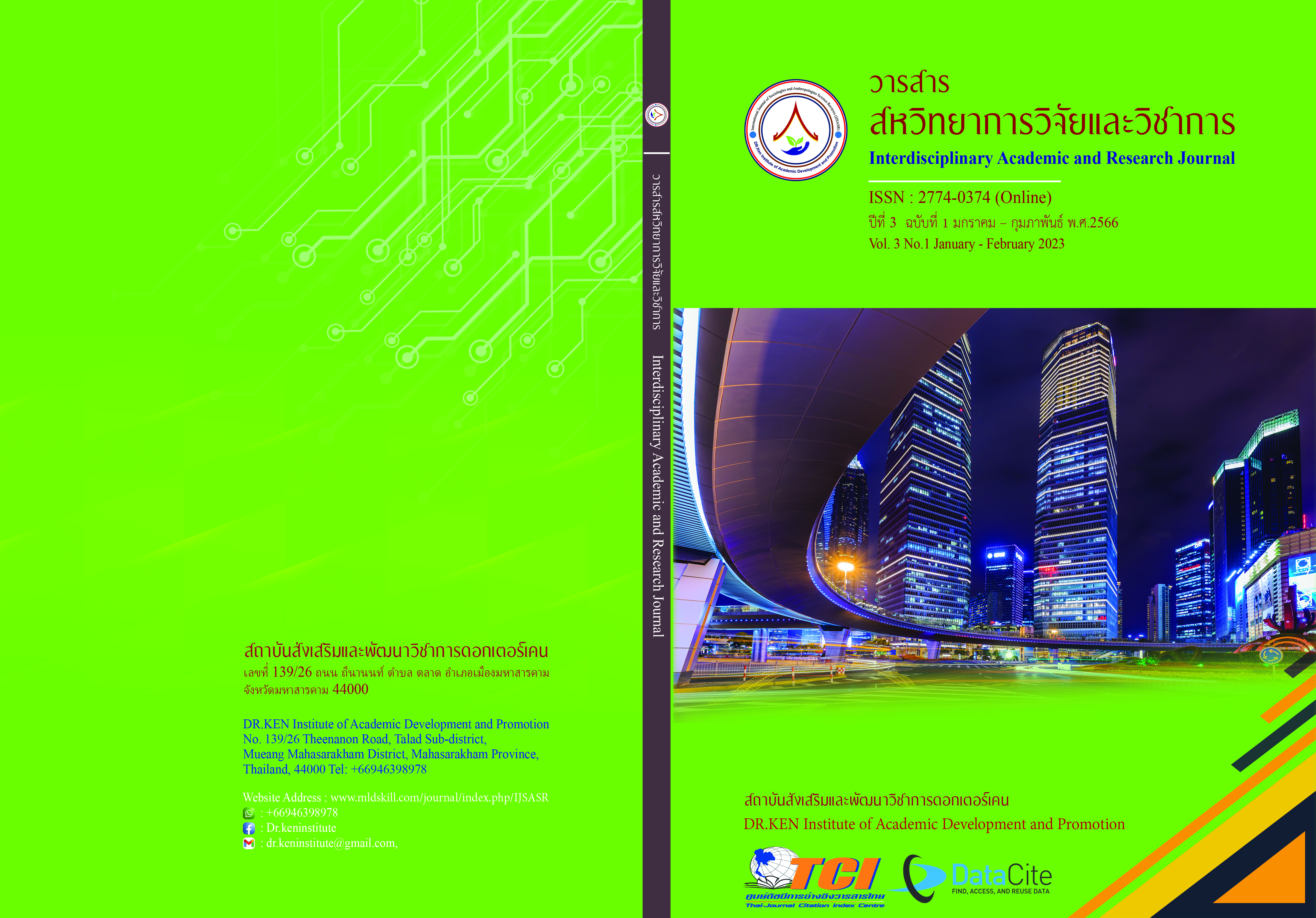The Guidelines for Change for Sustainable Business Development Based on ESG Principles
DOI:
https://doi.org/10.14456/iarj.2023.14Keywords:
Change; , Sustainable business development; , ESG principlesAbstract
With the changes in various aspects of the environment in modern times, as a result, business operators need to drive sustainable development goals by using various concepts. The concepts that are widely accepted in the present era for sustainability are the ESG concepts, which It is concepts that investors use when making investment decisions. It will give importance to doing business concerning 3 main responsibilities: the environment (Environment), society (Social), and governance (Governance). Social is a criterion that measures how businesses manage relationships and communicate with customers. raw material suppliers, customers, or stakeholders? and governance is criteria that measure how a business manages its governance relationship services. for efficient, transparent, verifiable management of stakeholders. In this article, the author would like to present the concept and principles of sustainable development. The concepts and principles of ESG, perspectives, and results of sustainable development. and change guidelines for sustainable business development according to ESG principles so that business operators will be able to apply the information presented by the author in this article as a guideline for developing and improving work processes to achieve business sustainability, continue both now and in the future.
References
กาญจน์กมล พรมเหลา. (2564). แนวคิด ESG คืออะไร ทำไมถึงได้รับความนิยมในกลุ่มนักลงทุนในปัจจุบัน. Retrieved from: https://www.tris.co.th/esg/.
เกษร เกษมชื่นยศ. (2563). การพัฒนาของไทยตามเป้าหมายการพัฒนาที่ยั่งยืน. วารสารจันทรเกษมสาร, 26(1), 16-30.
คณะกรรมาธิการกองทุนหมูบ้านและชุมชนเมืองแหงชาติ. (2546). โครงการเพิ่มประสิทธิภาพการบริหารจัดการกองทุนหมู่บ้านและชุมชนเมือง. กรุงเทพฯ: คุรุสภา.
จีรนันท์ นาคสมทรง. (2563). เศรษฐกิจหมุนเวียนหนทางสู่การพัฒนาที่ยั่งยืนและบทบาทของการบัญชี. วารสารการบัญชีและการจัดการ มหาวิทยาลัยมหาสารคาม, 12(3), 157-172.
ธารทิพย์ พจน์สุภาพ. (2563). ธุรกิจระดับโลกกับเป้าหมายการพัฒนาที่ยั่งยืน. วารสารการบัญชีและการจัดการ มหาวิทยาลัยมหาสารคาม, 12(4), 156-174.
นิรันดร จงวุฒิเวศย. (2549). การจัดการความรู้สู่การพัฒนาที่ยั่งยืน. วารสารพัฒนาชุมชน, 45(4), 8-10.
บานชื่น นักการเรียน และเพ็ญศรี บางบอน. (2559). การพัฒนาที่ยั่งยืน. สิรินธรปริทรรศน์, 17(2), 64-69.
พระธรรมปิฎก (ประยุทธ ปยุตฺโต). (2539). การพัฒนาที่ยั่งยืน. กรุงเทพฯ: สหธรรมิก.
ไพฑูรย์ พงศะบุตร. (2544). พจนานุกรมฉบับที่ 27. กรุงเทพฯ: ไทยวัฒนาพานิช.
วิไลพร ทวีลาภพันทอง. (2563). มาทำความรู้จักกับ ESG แนวคิดการดำเนินธุรกิจอย่างยั่งยืน. Retrieved from: https://www.pwc.com/th/en/pwc-thailand-blogs/blog-20201224.html.
สันติ บางอ้อ. (2546). การพัฒนาชนบทอย่างยั่งยืน. กรุงเทพฯ: สำนักงานคณะกรรมการพัฒนาเศรษฐกิจและสังคมแห่งชาติ.
สำนักงานคณะกรรมการพัฒนาเศรษฐกิจและสังคมแห่งชาติ. (2545). แผนพัฒนาเศรษฐกิจและสังคมแห่งชาติฉบับที่ 9 พ.ศ. 2545-2549. Retrieved from: https://www.nesdc.go.th/ewt_w3c/ewt_dl_link.php?nid=3784
อรุณี ตันติมังกร และศุภกร เอกชัยไพบูลย์. (2560). GRI Standards: จากการรายงานสู่เครื่องมือการจัดการธุรกิจอย่างยั่งยืน. Retrieved from: https://www.set.or.th/sustainable_dev/th/sr/knowledge/files/articles/2017_vol2_03_GRIstandard.pdf.
M. (2020). การพัฒนาธุรกิจของเรา โลกของเรา และทุกชีวิต. Retrieved from: https://www.3m.co.th/3M/th_TH/sustainability-th/stories/full-story/?storyid=d9fdfeca-ed72-4df8-bf04-a5fa84a9a9bf.
Ben-Eli, M. (2018). Sustainability: Definition and five core principles a new framework the sustainability. Sustainability Science, 13, 1337-1343.
Lifshitz, I. (2015). The positive impact of sustainability labels. Retrieved from https://www.labelandnarrowweb.com/contents/view_experts-opinion/2015-09-08/the-positive-impactof-sustainability-labels/.
Murray, T. (2017). ROE (Return on Environment) Is the new ROI: How Sustainability Drives Business Success. Retrieved from https://www.forbes.com/sites/Edfenergyexchange/2017/09/20/roe-return-on-environment-is-the-new-roi-how-sustainability-drives-business-success/#f8914b57eb5d.
Nike Inc. (2020). Nike FlyKnit. Retrieved from https://www.nike.com/th/flyknit Nissan
O’Rourke, D., & Ringer, A. (2015). The Impact of Sustainability Information on Consumer Decision Making. Journal of Industrial Ecology, 20(4), 1-11.
OECD. (2018). OECD Due Diligence Guidance for Responsible Business Conduct. Retrieved from: http://mneguidelines.oecd.org/OECD-Due-Diligence-Guidance-for-Responsible-Business Conduct.pdf.
PwC. (2020). Making sense of ESG. Retrieved from: https://viewpoint.pwc.com/dt/us/en/pwc/in_the_loop/in_the_loop_US/making-sense-of-esg.html.
Smith, G. (2019). Sustainable businesses attract the best talent - here’s how to become one. Retrieved from: https://www.smartcompany.com.au/people-human-resources/recruitment-hiring/ sustainable-business-talent/.
Walmart Inc. (2020). Walmart’s Efforts Toward Sourcing Seafood Sustainably. Retrieved from: https://www.walmartsustainabilityhub.com/sustainable-Seafood.
Whelan, T., & Fink, C. (2016). The Comprehensive Business Case for Sustainability. Retrieved from: https://hbr.org/2016/10/the-comprehensive-business-case-for-sustainability.
Downloads
Published
How to Cite
Issue
Section
License
Copyright (c) 2023 Suwimon Mathuros, Juntima Teerarujikajohndej, Yada Chuenchum

This work is licensed under a Creative Commons Attribution-NonCommercial-NoDerivatives 4.0 International License.
Copyright on any article in the Interdisciplinary Academic and Research Journal is retained by the author(s) under the under the Creative Commons Attribution-NonCommercial-NoDerivatives 4.0 International License. Permission to use text, content, images, etc. of publication. Any user to read, download, copy, distribute, print, search, or link to the full texts of articles, crawl them for indexing, pass them as data to software, or use them for any other lawful purpose. But do not use it for commercial use or with the intent to benefit any business.
















.png)


